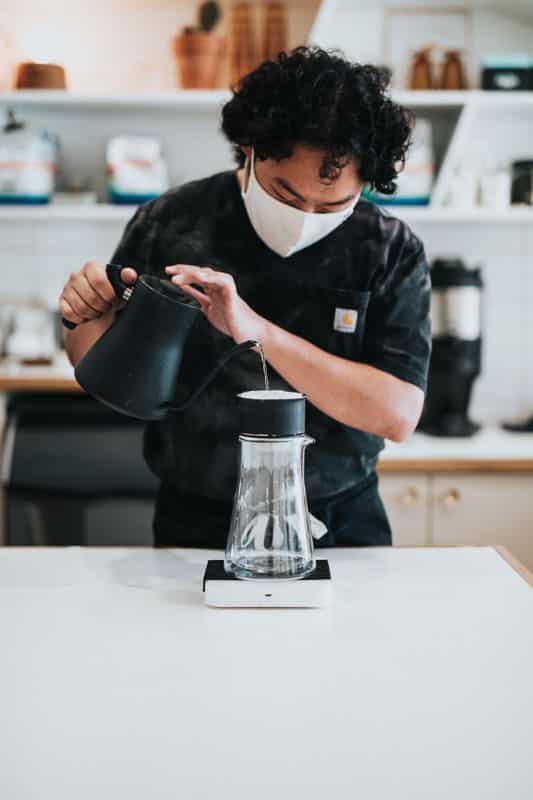
There are several different theories on the effects of coffee on your digestive system, including the fact that decaf causes hard, dry stools. Others argue that coffee activates the gastrocolic reflex, which leads to bowel contractions. In this article, we’ll examine the effects of coffee on the gastrocolic reflex and irritable bowel syndrome. In addition, we’ll explore whether decaf causes hard stools and the impact of coffee on the gastrocolic reflex.
Decaf coffee causes hard, dry stools.
Many people wonder if decaf coffee causes hard, dry stools. One theory is that decaf coffee increases gastrin production in the intestines, which stimulates the release of stomach acid. This helps the body digest food and absorb vitamins, but the increased amount of gastrin can make bowel movements more difficult and cause the development of stomach ulcers and diarrhea. Therefore, if you drink decaf coffee, avoid this drink until you have a solution to the problem.
Many people think that decaf coffee is healthier for them, but this has not been scientifically proven. Nevertheless, decaf coffee can still trigger the urge to poop, as its caffeine can affect the nervous system, which activates motor movements in the colon. As a result, the decaffeinated variety of coffee may be the reason for your hard, dry stools.
However, some people may not experience this problem if they drink decaf coffee. The caffeine in decaf coffee causes the same or even greater stimulation in the intestines that causes a bowel movement. However, a decaf beverage may contain additives or chemicals that cause diarrhea. In this case, it’s essential to consult your physician. While the effects of decaf coffee are unknown, drinking it may help relieve the symptoms of constipation.
The caffeine in decaf coffee also stimulates the muscles in the digestive system so that it can cause constipation. Caffeinated coffee should be avoided if you suffer from constipation. Caffeinated coffee also inhibits energy absorption, making it more likely to cause constipation. Caffeine can cause diarrhea and constipation. If you’re suffering from constipation, consult with your doctor.
The acidity of coffee causes bowel contractions.
 The acidity of coffee is the most commonly cited culprit, but the truth is that it can have the opposite effect on some people. According to a 1998 study, decaffeinated and caffeinated coffee stimulate bowel contractions more than water. The results showed that caffeinated coffee prompted sixty percent more bowel movements, and decaffeinated coffee caused only two-thirds as many.
The acidity of coffee is the most commonly cited culprit, but the truth is that it can have the opposite effect on some people. According to a 1998 study, decaffeinated and caffeinated coffee stimulate bowel contractions more than water. The results showed that caffeinated coffee prompted sixty percent more bowel movements, and decaffeinated coffee caused only two-thirds as many.
Caffeine may increase bowel contractions by relaxing the anal sphincter, the muscular valve in the intestine that controls stool movement. But the intestines and colon muscles also contract during the first hour of coffee consumption, so coffee could affect the bowels similarly to meals. Coffee may also affect the large intestine’s forces, which is why it can cause irregular bowel movements.
If coffee causes bowel contractions in some people, avoiding it may help. The acidity of coffee can also be reduced. Cold-brew coffee contains up to 70 percent less acid than its regular counterpart. Drinking it during cooler temperatures may help alleviate your bowel problems. In addition to promoting healthy digestion, coffee is also known to boost the production of bile acids. Therefore, coffee with low acid content may be a better option.
A recent study suggests that coffee has a laxative effect, although the effects of coffee consumption are still controversial. It may not be beneficial for a person already suffering from constipation or irritable bowel syndrome. However, it can stimulate colonic activity in only 30 percent of people. Additionally, coffee increases gastric acid production, which helps move food through the intestine.
People who are lactose intolerant or suffer from IBS are more likely to experience constipation from drinking coffee. Other people are sensitive to coffee and may need trial and error to find a solution that works for them. Avoiding coffee altogether may be a good idea for those keen on coffee. But if you’re suffering from constipation caused by coffee, you may want to reduce your intake of coffee until you find a solution that works for you.
Effect of coffee on the gastrocolic reflex
Coffee is often a stimulant of the gastrocolic reflex, the body’s signal to move solid matter through the gastrointestinal tract. The acidity of coffee and the secretion of hormones called cholecystokinin and gastrin cause the body to respond by increasing rectum and colon motility. The caffeine and other chemicals in coffee may affect other parts of the digestive system, affecting digestion and bowel movements. The gastrocolic reflex involves the muscles, nerves, and hormones that move solids through the intestines. This mechanism is responsible for eliminating unnecessary waste from the body.
Research has shown that a person suffering from irritable bowel syndrome is more likely to experience a strong urge to poo following drinking coffee. This occurs because caffeine activates the gastrin hormone, which stimulates the contraction of the bowel muscles, causing the person to go to the bathroom. The coffee also softens stool, though some people are sensitive to caffeine and dairy. However, this problem is not as widespread as coffee users thought.
Experts disagree on the exact cause of coffee’s bowel stimulation and are unsure what exactly causes the reaction. Experts are hard-pressed to develop a clear explanation, but many believe it is because caffeine helps to rev up the body’s internal processes. For some people, the coffee-induced bowel stimulation can be a welcome part of the morning ritual, while others may find it uncomfortable.
Even though the effects of coffee on the gut are not yet fully understood, these effects may be beneficial. Having impaired bowel function can lead to bloating, inability to pass gas, and difficulty consuming solid food. However, a study published in 2020 analyzed the results of seven clinical trials and found that drinking coffee helped patients with bowel dysfunction tolerate solid foods faster and decreased the length of time before they had their first bowel movement.
The effects of coffee on the gastrocolic reflex depend on the amount of coffee consumed. One cup of coffee contains approximately half of the caffeine your body needs to function normally. The other half does not affect your bowel movements. This means that coffee can positively and negatively affect the gastrocolic reflex. Although this study doesn’t prove that coffee causes bloating or gas, coffee can stimulate the same effect in people who have regular bowel movements.
Effect of coffee on irritable bowel syndrome
The effects of caffeine on people with Irritable Bowel Syndrome are still unknown. However, it’s known to trigger gastrointestinal symptoms in some people. This is because caffeine increases colonic motor activity. In one study, caffeine consumption increased the need to defecate in nearly one-third of healthy participants. The findings also suggested that caffeine increases gastrointestinal motility, which is the movement of the digestive system’s contents.
Although the results were not statistically significant, they did suggest that caffeine consumption was associated with an increased risk of developing IBS in the overall population. In the same study, coffee consumption was significantly related to the development of symptoms in both women and those with a BMI greater than 25 kg/m2.
Some people with IBS are more sensitive to caffeine, which may cause a more dramatic effect. Caffeine is a stimulant that causes the nervous system to become overly stimulated, so people with IBS may react differently to coffee. However, people without IBS don’t suffer from the same over-excited gut nervous system, so the caffeine effect may not be as severe. Therefore, it’s best to consult a doctor before drinking coffee.
If you are unsure whether coffee triggers your IBS symptoms, keep a food diary and note when your symptoms occur. If you’re sure that coffee is the culprit, consult a dietitian for further testing. Your doctor can test you for caffeine sensitivity or other food intolerance factors and suggest an appropriate treatment plan. If you can’t figure out which food is causing your symptoms, try limiting coffee consumption or removing it altogether from your diet.
The caffeine found in coffee increases the gut’s motility. This increases the flow of bile, which can worsen IBS symptoms. A coffee fix can also help you feel refreshed and energized, essential for busy workdays. Caffeine may also cause diarrhea and increase stomach acid production. However, caffeine is more likely to trigger IBS symptoms in people with diarrhea than those with constipation.




